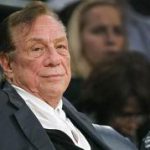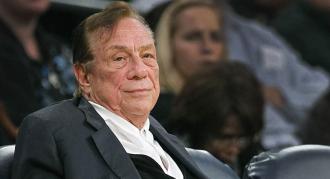
Four years after its formation in 1946, the National Basketball Association (NBA) decided to go against the social stigma of its time: racial segregation. In 1950, the league allowed black players to play for professional teams. With this decision, the NBA affirmed a new dedication to racial inclusiveness and the moral responsibility to treating everyone with dignity, kindness, and respect — because these are the virtues all human beings deserve, regardless of who they are.
At the time of desegregation in the NBA, the decision wasn’t taken well, at all. Fans booed, yelled racial slurs at the first black players in the NBA — players such as Chuck Cooper, Earl Lloyd and Nate Clifton —made threats, talked a game of blind hatred and animosity.
Thankfully, the opponents of social progress lost, and progress won.
So when V. Stiviano — the personal assistant for Donald Sterling — revealed the racist and abhorrent remarks made by Donald Sterling to the NBA and the world, it was downright unsettling. Sterling told her she shouldn’t bring black friends to any games or pose on instagram or twitter with any black individuals, including Earvin Magic Johnson.
Today, 76% of the players in the NBA are black. They are some of the most exciting and talented athletes in the world. For Sterling to have the audacity to tell Stiviano to not associate with black people is sick and twisted. This clear prejudice uncovers Sterling’s checkered history: he settled in court in a housing discrimination lawsuit, in which he allegedly claimed a preference to whites over latinos, immigrants and African Americans. Mr. Sterling also had the nerve to state that black players should be thankful to him, for he pays them their exorbitant salaries.
He is only wrong again. Actually, Mr Sterling, the players earn the money in ticket sales and advertising you use to pay for your lofty annual salary and grand lifestyle.
You’ve probably already noticed, but every time this guy opens his mouth he has something incredibly moronic to say. As President Obama said of Sterling, “When ignorant folks want to advertise their ignorance, you really don’t have to do anything, you just let them talk…” In this case, the President’s definitely right. With the freedom to speak our minds as American citizens, there are a lot of ignorant folks — and they typically become the loudest voices.
That’s why NBA commissioner Adam Silver gave Sterling a lifetime ban, which prohibits him from going to any NBA games or practices, being present at Clippers facilities or offices, and attending NBA Board of Governors meetings or any other any other league activity.
This just ban complies with the NBA Code of Conduct. While Sterling technically said nothing illegal and used no racial slurs or other derogatory language, the NBA is a private enterprise and holds the right to punish its constituents for violating company policy. Mr. Sterling may be an owner, but he’s not exempt from this standard. All product suppliers in the NBA are required to “conduct their businesses with the highest standards of ethical behavior,” and the NBA “reserves the right, in addition to all other legal and contractual rights, to terminate its relationship with any Product Supplier found to be in violation with this code.” Mr Sterling did not conduct his business with high ethical standards: he harassed an employee for hanging out with members of a different racial group and displayed racist attitudes toward them.
While a lifetime ban against Sterling is fair and justified, the NBA shouldn’t force Sterling to sell his team. The NBA has the power to under the NBA Constitution if ¾ of owners vote to force Sterling to sell, but this decision would be a disastrous route, one in which the NBA would be on the wrong side of the law. Soon, the owners of the NBA will vote on this matter. The now defamed owner has already stated that he would bring the NBA to court if it succeeded in forcing him out — a legal battle that could be epically long and painfully difficult and worse — Sterling would win.
An American citizen can’t be forced to sell his or her property for saying something overtly controversial and repugnant. Hate what the man says, but defend his right to say it. The NBA would have an argument if Sterling used hate speech, which is illegal, but he didn’t. He showcased his beliefs in a private conversation. That doesn’t warrant this kind of response.
For example, should the government shut down the Chick-fil-A restaurant chain because its CEO made several strongly worded anti-gay marriage statements? No — I just won’t eat there.
This idea of an empowered citizenry is important. In the case of Donald Sterling, just don’t attend Clippers games. Don’t watch Clippers games. Protest, boycott, refuse to buy Clippers gear, or work for him if you are a player or coach. Watch the advertisements go bye-bye. Hurt him where his pockets are.
These actions, on the individual level, will succeed. They’d isolate Sterling even further — forcing him out on his own terms. There’s nothing right or defendable about what he said, but the NBA would have a difficult time with this issue in court considering the circumstances surrounding this incident. A court would most likely be very hesitant to buy the idea of a forced sell because of an exercise of free speech in private, which does not justify anyone from being stripped of his or her property.
Institutional racism has existed for far too long in America, and it still exists today. Over the years, the NBA has tried to improve its own institutional disparities. It has succeeded, creating a sport where a man’s skin color doesn’t prevent him from having the same opportunities as anyone else. Not the same can be said for the rest of society. The large disparities in socioeconomic status and incarceration rates between whites and minority groups tell a part of the story, where a child born of a different color in America in the year 2014 still is statistically at a huge disadvantage, standard of living and opportunity wise. Even so, the NBA shouldn’t deal with its own problems by forcing Sterling to sell his team, but rather, they should strengthen its values by empowering people to come together and fight against prejudice. Cheer for the Lakers instead.








